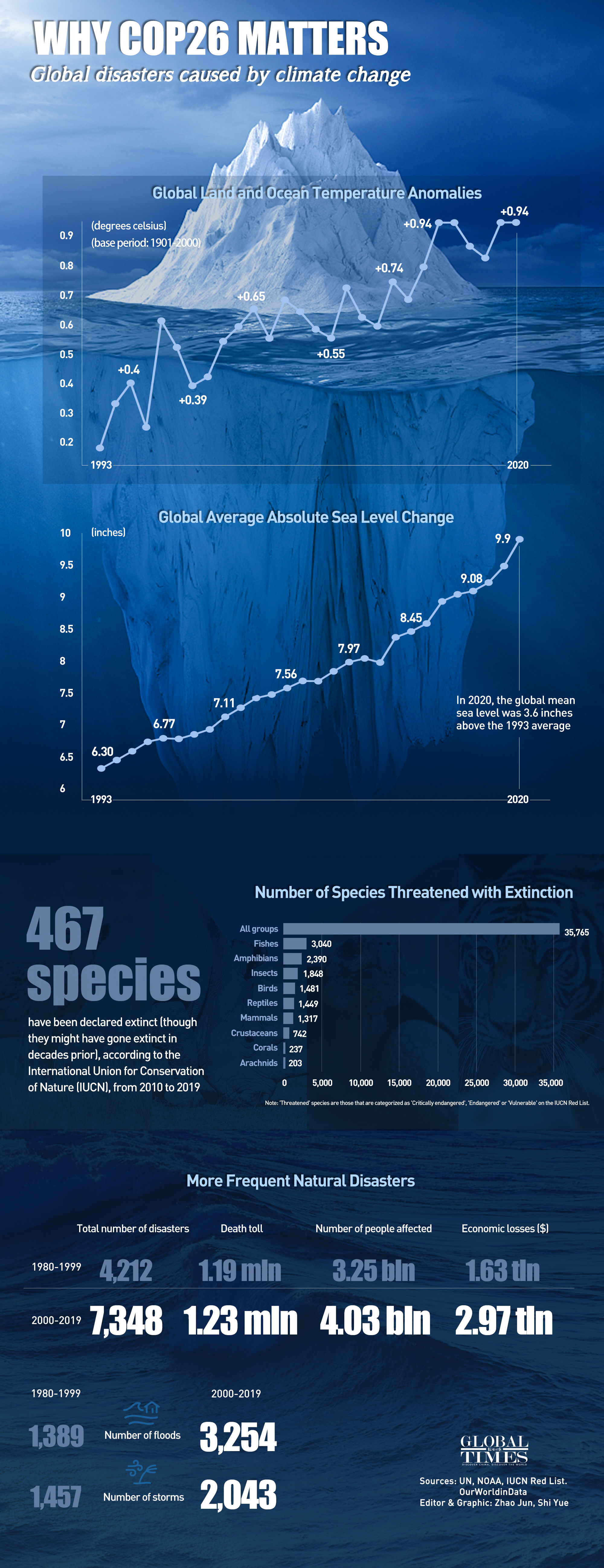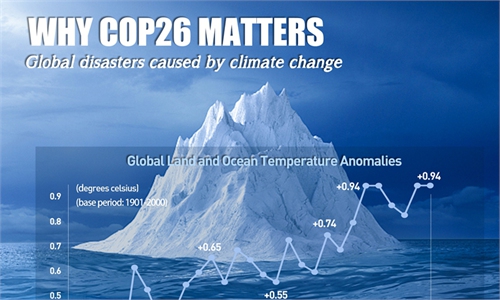GT investigates: How developed nations shift blame on climate change
Politicizing issue hurts global cooperation: expert

People walk past an Eden Project display inside the COP26 venue in Glasgow, the UK on Monday, on the first day of the COP26 UN Climate Change Conference being held in the city. Photo: AFP
Though they have the world's highest per-capita greenhouse gas emissions and transfer polluting companies to less developed regions, in terms of confronting climate change, developed countries continue to shift the blame to developing countries, and have failed to fulfill their obligations. The familiar scene could have resurfaced and caused tensions at the 26th United Nations Conference of Parties on Climate Change (COP26) in Glasgow, Scotland.
Xie Zhenhua, China Special Envoy for Climate Change, noted on Tuesday in Glasgow that "rich nations made a significant pledge to channel $100 billion a year to less wealthy nations by 2020 twelve years ago, and this hasn't been fulfilled."
He underlined the significance of putting the Paris agreement into practice, saying it is important to translate the political will of countries into action, CGTN reported.

Why COP26 matters - Global disasters caused by climate change. Graphic: GT
As the COP26 summit continued, Western media reported that Chinese and Russian leaders were absent from the meeting, which they said "raised questions" on the countries' commitment to lower emissions.
Chinese President Xi Jinping participated in the summit through a written statement on Monday, reaffirming China's goals and measures, and called on stronger global actions on climate change. Last year, the country announced its goals to achieve a carbon peak before 2030 and carbon neutrality before 2060.
Instead of reflecting on what they have done to the global climate, some Western politicians and activists have been pressuring developing countries.
US President Joe Biden expressed his disappointment by claiming China and Russia "basically didn't show up" on the issue during the G20 summit in Rome.
"Why should the UK be making changes when China is still polluting?" climate activist Greta Thunberg told BBC on Sunday.
Observers noted that Western politicians are always busy peddling this narrative in an attempt to shift the responsibility of climate change, turning a blind eye to the fact that developed countries, even today, are the main culprits of CO2 emissions.
Developed countries have been "polluting, managing, then transferring [the pollution to other regions]." But developing countries such as China and India, will not follow them in damaging the environment of the planet, a Chinese top environmental researcher told the Global Times.
"The practice of politicizing the climate issue is not conducive to global climate cooperation," he said.
Too many to record
Accusing China and other developing countries in terms of greenhouse gas emissions is a common trick for some Westerners, who, after enjoying the benefits at the cost of polluting the environment for decades, now start to blame other countries for "emitting too much greenhouse gases."
World Bank data released by the World Bank in March show the per-capita carbon emissions of China was 6.4 metric tons per citizen, 15th in the world, much fewer than major developed countries including the US (17.6), Canada (15.7), Australia (14.9) and South Korea (13.3). In 2018, the average CO2 emissions of high-income countries and regions was 10.3 metric tons per capita, while for China was 7.4.
A previous study of two Stanford University scientists found that the US, Japan and many Western European nations managed to "'outsource' more than half of their CO2 emissions and evade responsibility for their share of the climate-altering pollution," by exporting their production needs to developing countries.
Looking back at the last half century, developed countries led by the US contributed the overwhelming majority of emissions in their industrialization. World Bank statistics show that the US' CO2 emissions stayed more than 18 metric tons per capita between 1966 and 2008, with a high of 22.5 in 1973.
Aside from domestic emissions, the US-led Western world started setting up factories in developing countries, including China and India, under pressure from environmentalists. Pollution-intensive companies accounted for 29.12 percent of all companies built in China by foreign investors in 1991, and 39 percent of foreign-invested companies in China were "highly polluting," Chinese media reported.
The US outsourced about 11 percent of total consumption-based emissions, primarily to the developing world, according to the study, "Consumption-Based Accounting of CO2 Emissions," published in 2010.
Of the CO2 emissions linked to goods and services consumed in many European countries, more than a third "actually occurred elsewhere," the report said.
On the other hand, as the "world's factory," 29 percent of China's emissions were attributed to products shipped to developed countries, an article released on the Chinese carbon emissions website tanpaifang.com in 2014 said.
For decades, the US' overseas factories have polluted developing nations, some of which even led to deadly incidents. On December 3, 1984, residents in Bhopal, India were poisoned by 40 tons of toxic gas from a factory owned by Union Carbide. The poison gas leak killed 15,000 more in the succeeding weeks, and "hundreds of thousands still suffer from the effects of exposure and contamination of land and water," the Guardian reported in an article in memory of the disaster's 25th anniversary.
Developed countries first enjoyed rapid development, and then transferred pollution after the ecosystem was destroyed and the environment was polluted, while developing countries only take over polluting industries to defeat poverty, Li Haisheng, president of the Chinese Research Academy of Environmental Sciences, told the Global Times.
But the world has a shared future for life on earth. He quoted Friedrich Engels as saying, "Let us not, however, flatter ourselves much on account of our human victories over nature. For each such victory nature takes its revenge on us."
Broken promise
During the United Nations climate summit in 2009 in Copenhagen, developed countries promised to channel $100 billion a year to developing countries by 2020 to help them confront climate change, but the promise was not fulfilled, making it another example of how developing countries failing to act.
Funding has become a focus in Glasgow, which, according to a Nature report in late October, has increased tensions between different parties before COP26.
The report quoted Saleemul Huq, director of the International Center for Climate Change and Development, as saying that "By the time we get to Glasgow, if they haven't given us another $100 billion [for 2021], then they are completely unable to meet their obligations."
Developed countries claimed that they contributed $80 billion in climate finance to developing countries in 2019, and $78 billion in 2018.
Developed and developing countries also differ on what finance means.
"To developing countries, the financing are public funds used for aid, but for the developed countries, they talk about the money to 'mobilize,'" Wang Mou from the research center of urban and environment studies of the Chinese Academy of Social Sciences, who is also a member of the Chinese delegation to COP26, said during a recent online conference.
Even the funds developed countries claim to have given are inflated. For instance, they even count the travel fees of some experts. The Nature report also pointed out that road construction projects were counted as climate aid.
"Funding is not a donation or aid, but an obligation of developed countries," noted an officer from the Chinese delegation on Monday.






